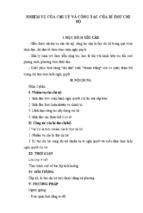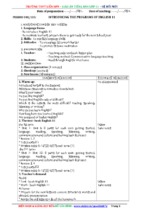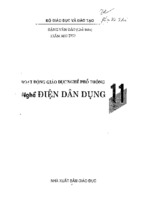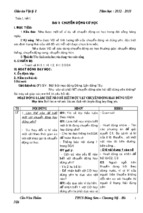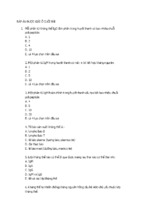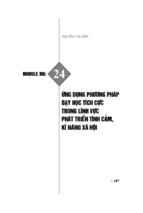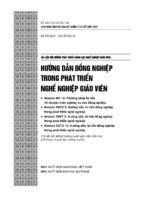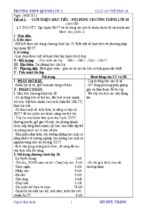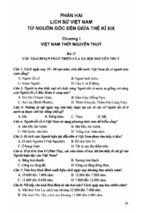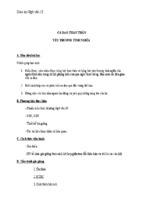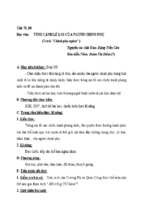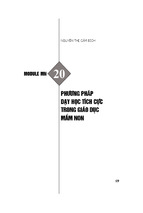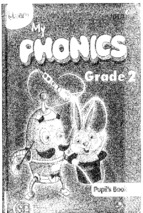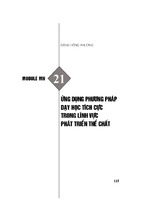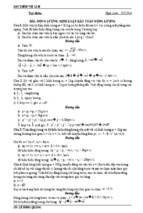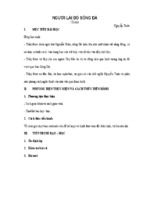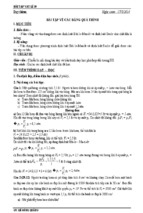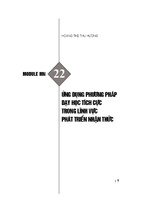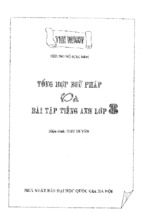PHUOC LONG HIGH SCHOOL
ENGLISH TEACHER: DOAN VU PHUONG
Date of planning: ………………….
Week: ……………..
Period:………………
Unit 2: CULTURAL DIVERSITY
PART A: READING
I. Aims: By the end of the lesson, students will be able to:
- have some background information about the difference between American and Asian thoughts
on love and marriage such as physical attractiveness, confiding, partnership of equals, trust built on
love,…
- improve their reading skill by explaining the meaning of words and answering questions
II. Teaching aids: Textbook, cassette player.
III. Procedure:
Teacher’s activities
Warm – up (4 mins)
Matching
- Ask Ss to work in groups and match the names of kinds of
Vietnamese culture in English in column A with its equivalents
in Vietnamese in column B
A
1. love
2. traditional music
3. long traditional dress
4. marriage
5. mid-autumn festival
6. funeral rite
7. lunar Tet holiday
- Do matching and answer
B
a. áo dài
b. đám cưới
c. tình yêu
d. tết nguyên đán
e. đám ma
f. nhạc cổ truyền
g. tết trung thu
Keys : 1. c 2. f
3. a
4. b
5. g
6. e
7. d
Pre-reading (13 mins)
- Ask Ss to discuss the questions: Which of the following factors
is the most important for a happy life/marriage life? Why?
- Let them answer naturally and explain their choice
- Introduce the lesson: “You are going to read about American
and Asian thoughts on love and marriage. And then do the tasks
that follow”
* Vocabulary
+ bride (n): chú rể
+ groom(n): cô dâu
+ survey (v, n): điều tra, cuộc điều tra
+ A/the majority of + N + V (pl): đại đa số
+ unwise ≠ wise (a): thông minh, sáng suốt = smart, clever
+ partnership of equal: sự bình đẳng trong cuộc sống chung
+ contractual (a): thỏa thuận, sắp đặt
+ romantic (a): lãng mạn
+ value = factor (n): yếu tố
While Reading
Use the textbook: Silent reading (4’)
Task 1: (6 mins)
- Ask Ss to read the statements and find the meaning of the
italicized words. Ask them to translate the whole sentences
- Call on Ss to answer
+ precede (n): đến trước
+ determine (v): xác định, phát hiện
D:lessonplangrade12
Ss’ activities
- Answer the questions and Ss’
answers may vary
- Listen and repeat the words
- Copy down
- Read the statements and find the
words’ meanings.
- Answer.
- Read the words after teacher’s
modeling.
- Write the words down.
PHUOC LONG HIGH SCHOOL
ENGLISH TEACHER: DOAN VU PHUONG
+ confide in (v): chia sẽ, tâm tình
+ sacrifice (v): hy sinh
+ be obliged + to V (v): bị bắt buộc để làm…
Oblige + sb + to V
- Read the text & answer the
Task 2: (10 mins)
questions
- Have Ss read the reading again & find the answers
- Listen to the answer and correct
- Go around to check the students’ answers and offer help
the answer. Then copy down
- Ask Ss to answer
Suggested answers:
1. Americans believe in “romantic” love……….not precede it.
2. They are Physical attractiveness, confiding, partnership of
equals and trust built on love.
3. The Americans are concerned much more than the
Indians…..or a husband.
4. The Indian students agree that a woman has to sarcifice more
in marriage than a man.
5. The American wife trusts her husband to do the right thing
because he loves her not because he has to.
6. The main finding of the survey is that young Asians are not as
romantic as their American counterparts.
- Discuss and brainstorm for the
After reading (8 mins)
suggestion then report
- Have Ss work in groups and discuss: the differences between a
- Do homework
traditional Vietnamese family and a modern Vietnamese family
Homework
- Learn new words by heart
- Rewrite the differences between a traditional Vietnamese
family and a modern Vietnamese family that they discussed
- Prepare for the next part : Language focus
IV. Feedback: …………………………………………………………………………………………….
…………………………………………………………………………………………………………….
......................................................................................................
Date of planning:
Week:
Period:
UNIT 2: CULTURAL DIVERSITY
PART E: LANGUAGE FOCUS
I. Aim: After the lesson, students will be able
- To pronounce more exactly the –ED endings.
- To use the right tenses of the verbs to do the exercises..
II. Teaching aids: cassette/ CD player, extra-board, textbook, and exercise book.
III. Procedure:
Teacher’s activities
Students’ activities
Warm-up
Play Game: Who is best at English
- Give instructions to play the game: Put the verbs in
- Listen to the teacher
brackets in the sentences into the correct tenses and then try - Look at the sentences
to speak out them as exactly as possible
- Take part in the game
1. The police (arrest) …….. an old man-beggar in front of
- Give the correct answers
the hotel yesterday.
2. I recently (miss) …….. a number of interesting films.
3. – (You, receive) ………his package yet?
- No, I ……… yet.
Pronunciation
D:lessonplangrade12
PHUOC LONG HIGH SCHOOL
Pronunciation of the ending – ED
+ “ed” is pronounced /id/ after words ending with /t/, and /d/
Ex: needed need + /id/
Wanted want + /id/
+ “ed” is pronounced /t/ after words ending with voiceless
sounds: /f/, /k/, /p/, /s/, /∫/, /t∫/
Ex: walked walk + /t/
Hoped hope + /t/
+ “ed” is pronounced /d/ after words ending with voiced
sounds: /b/, /g/, /l/, /m/, /n/, /dʒ/, /r/, /v/, /z/
Ex: loved love + /d/
Preferred prefer + /d/
Practice
. Reading the words (p.26)
. Reading the sentences (p.27)
Production
More exercise
1. A. wished B. robbed C. turned D. changed
2. A. needed B. invited C. wanted D. worked
Grammar - Review of tenses
Presentation
+ The present perfect
+ The present perfect continuous
+ The past simple
+ The present progressive
+ The simple future and Be going to
Practice
Exercise 1 (p.27) Complete the following Conversations
with the correct form of the verbs in the box:
See, drink, write, cook
- Have Ss work in pairs to give the answers and practice
speaking.
- Call on some Ss to answer and give correction.
Keys:
1. Have you seen - saw - am going to see
2. drank - haven’t drunk - drank
3. has written - Did she write - wrote
4. You have been cooking – cooked - cooked
Exercise 2 (p.28) Circle the letter A, B, C, or D to complete
the passage.
- Call on Ss to answer and explain their choice
- Give feedback and correction
Keys:
1. C
2. A
3. C
4. A
5. C
6. A
7. C
8. A
Exercise 3 (p. 29) Complete the letter with the correct forms
of the verbs in brackets
- Ask Ss to do the exercise and compare with their partners
- Call some Ss to answer
Keys:
1. moved
2. moved
3. have asked
4. haven’t stopped
5. study
6. will fail
D:lessonplangrade12
ENGLISH TEACHER: DOAN VU PHUONG
- Listen to the teacher’s modelling
and take notes
- Repeat after teacher or the tape.
- Practise.
- Say the uses of tenses.
- Work in pairs.
- Practise the conversation.
- Copy.
-Circle the best answer.
- Answer and explain after
exchanging their answers.
- Work in pairs.
- (Ss do the exer.3 at home if no
more time).
- Take notes.
PHUOC LONG HIGH SCHOOL
ENGLISH TEACHER: DOAN VU PHUONG
7. could talk
Production
- Tell a short story
- Tell a short story about yourself or someone else using the
tenses you have just studied
HOMEWORK:
- Do homework
- Do the exercise 1, 2, 3 p. 14, 15 (Exer. Book)
- Prepare for the next part: Speaking
IV. Feedback: …………………………………………………………………………………………….
…………………………………………………………………………………………………………….
.............................................................................................................
Date of planning:
Week:
Period:
UNIT 2: CULTURAL DIVERSITY
PART B: SPEAKING
I. Aim: After the lesson, students will be able to
- compare and contrast the culture of a Western country and an Eastern one.
- express their point of view on cultural matters related to family life by using structures showing
agreement and disagreement such as I think,……, I don’t think so, I don’t agree, etc.
II. Teaching aids: Textbook, pictures.
III. Procedure:
Teacher’s activities
Students’ activities
Warm up
- Show some pictures of weddings with the country it
- Decide which country each
belongs to
wedding belongs to
Picture 1: Vietnamese wedding
Picture 2: Indian wedding
Picture 3: Japanese wedding
Picture 4: Western countries’ wedding
- Ask them: Do you think these wedding are the same? Why - Answer the question and give
or Why not?
reasons
Pre – speaking
* Vocabulary
- Learn new words to help them
+ generation (n): thế hệ
understand the lesson better
+ base on (v): dựa trên
+ old-aged (a): lớn tuổi, già
+ nursing home (n): nhà thương, bệnh xá, nơi an dưỡng
+ income (n): thu nhập
+ grocery (n): cửa hàng tạp hóa/tạp phẩm
+ own bedroom: giường ngủ riêng
- Ask Ss to retell the expressions often used to express
- Retell the expressions
agreement and disagreement
- Help them to rewrite
+ I think/believe/am sure……
+ In my opinion/point of view,…….
+ For me……..
+ That’s not true/That’s wrong..….
+ That’s/That’s not a good idea……….
+ I don’t agree/disagree…….
While - speaking
Task 1:
- Ask Ss to read and translate the sentences and the example - Work in pairs to express their
- Tell Ss to express their point of view on the following
point of view
D:lessonplangrade12
PHUOC LONG HIGH SCHOOL
ENGLISH TEACHER: DOAN VU PHUONG
sentences in pairs
- Go round to check Ss’ doing and offer help
- Call on some to act out
- Present their ideas in front of
- Comment and correct if mistakes
class
Task 2:
- Ask Ss to give some typical features of Vietnamese culture - Discuss in groups to complete
correlative with the information of typical ones of American the table
culture
- Make Ss work in groups of 4
- Go around to provide help and then call on some groups to - Report their discussion
report their results
Suggested answers:
- Write down
Three or sometimes four generations live under one
roof
Old-aged parents often live with their children or
grandchildren
It’s acceptable to ask questions about age, marriage
and income
A Vietnamese greets the head of the family or the
older person first, the younger ones
Groceries are bought every day
Tet (Lunar New Year) is the most important
Children often sleep with their parents
Post – speaking
- Continue to work in groups, take
- Have Ss continue to work in groups and talk about the
turns to talk about the differences
similarities and differences between Vietnamese and
and similarities between
American cultures, using the features discussed in task 2
Vietnamese and American cultures
Outline:
There are differences and similarities between Vietnamese
and American cultures. In American, …….In Vietnam,……
- Use more structures to talk
+ …..but/however/on the other hand……..
+ The similarity between …….and …….is that + clause
- Go around to offer help and check Ss’ doing
- Present
- Call on some Ss to present (by heart)
- Comment and give marks if necessary
Homework
- Practice speaking and writing
- Try to practice more at home and write a paragraph about
the information in task 2 & 3
- Prepare for the next part: Listening
IV. Feedback: …………………………………………………………………………………………….
…………………………………………………………………………………………………………….
D:lessonplangrade12
PHUOC LONG HIGH SCHOOL
Date of planning:
Week:
ENGLISH TEACHER: DOAN VU PHUONG
Period:
UNIT 2: CULTURAL DIVERSITY
PART C: LISTENING
I. Aim: After the lesson, students will be able to
- get further information about wedding ceremony in Vietnam through such words as couple, gifts,
tray of gifts, master of the ceremony,….
- enhance their listening skills by filling in the blanks and answering the questions.
II. Teaching aids: cassette/ CD player.
III. Procedure:
Teacher’s activities
Students’ activities
Warm up
- Ask Ss to make a list related to wedding
- Give the words
“Have you ever attended a wedding ceremony?
What do people often do at the wedding ceremony?
Where do they often hold a banquet?
Can you make a list related to wedding?”
Wedding
- Take notes
Suggested answers: bride, groom, party, tray, altar, flowers,
dress, master of the ceremony,…
Pre – listening
- Ask Ss to answer the question:
“What do the bride and the groom often do at the wedding
ceremony?”
- Call on some Ss to speak in front of class
The bride and the groom often stand in front of the altar
praying and asking their ancestors’ permission to be
married. They exchange their wedding rings.
* Vocabulary
+ altar (n): bàn thờ tổ tiên
+ Master of Ceremony: chủ hôn, chủ lễ
+ banquet (n): tiệc cưới
+ ancestor (n): ông bà, tổ tiên
+ tray (n): cái mâm, cái khay
+ blessing (n): may mắn, hạnh phúc, thịnh vượng
+ schedule (v): lên kế hoạch
While – listening
Task 1:
- Ask Ss to read the incomplete statements and then listen to
the tape to fill in the missing information
- Play the cassette player 2 – 3 times
- Call Ss to compare their answers
- Ask Ss to answer and write their answers on the board
Answer key:
1. groom’s parents
2. red papers
D:lessonplangrade12
- Answer the question
- Speak in front of class
- Listen and repeat the words
- Take notes
- Read the statements first
- Listen to the tape
- Compare their answers each
other
- Write the answers down
PHUOC LONG HIGH SCHOOL
ENGLISH TEACHER: DOAN VU PHUONG
3. altar
4. at the wedding banquet
5. wedding cards – money gifts
Task 2:
- Have Ss to work in pairs and read the questions carefully
- Read the questions carefully and
- Make sure that Ss understand all the questions
try to understand them thoroughly
- Play the tape
- Listen
- Call on them to answer
- Answer in front of class
- Give comment and correction
Suggested answers:
- Write down the answers
1. The most important thing the groom’s family has to do on
the wedding day is to go to the bride’s house bringing gifts
wrapped in red papers.
2. They would pray, asking their ancestors’ permission to be
married.
3. After they pray and ask their ancestors’ permission to be
married.
4. The wedding banquet is usually held at the groom and
bride’s home or at the hotel or a restaurant.
5. They stop by each table to thank their guests.
Post – listening
- Ask Ss to work in groups of 6 and discuss the question
“What do families do to prepare for a wedding ceremony?”
- Call on some to report their discussion
- Comment and correct if necessary
Homework
- Talk about a traditional Vietnamese wedding ceremony,
- Practice speaking about a
basing on the information in the listening.
traditional Vietnamese wedding
- Prepare for the next part: Writing
ceremony
IV. Feedback: …………………………………………………………………………………………….
…………………………………………………………………………………………………………….
...........................................................................................
Date of planning:
Week:
Period:
UNIT 2: CULTURAL DIVERSITY
PART D: WRITING
I. Aim: After the lesson, students will be able to
- to describe a symbol of Vietnamese culture
- get an insight into one of the Vietnamese cultural identities: conical leaf hat
- improve their writing skills
II. Teaching aids: structures for writing and outline
III. Procedure:
Teacher’s activities
Students’ activities
Warm up - Realia
- Show a conical leaf hat and ask Ss:
- Give the answers
1. What is it? Have you ever worn it?
2. Are you proud of it? Why or why not?
Pre – writing
Task 1:
- Ask Ss to look at the hat and give the Vietnamese
- Look at the picture and give the
equivalents for the English words
words’ Vietnamese meaning
- Teach Ss to read four words
- Read the words
- Ask them to answer
- Answer
D:lessonplangrade12
PHUOC LONG HIGH SCHOOL
ENGLISH TEACHER: DOAN VU PHUONG
Keys:
+ leaf (n): lá
- Make choral repetition and
+ rim (n): vành
individual repetition
+ ribs (n): sườn nón, gân nón
- Take notes
+ strap (n): quai nón
* Vocabulary
+ symbol (n): biểu tượng
+ spirit (n): tinh thần
+ conical (a): hình nón, hình chóp
Conical leaf hat: nón lá
+ diameter (n): đường kính
+ cover …..with (v): phủ lên ….với …
+ protect sb from sth/V-ing (v): bảo vệ ….khỏi
+ look + adj (n): trông ….
+ palm leave (n): lá cọ
While – writing
Task 2:
- Read and understand all the
- Ask Ss to read the information in the table
information to write better
- Notice Ss the outline for writing
Outline:
- Notice the outline teacher gives
* Introduction:
+ S + be + one of + the + N (pl)
* Main body:
+ S + be + made from ….
+ S + be + shaped in ….
+ ….from ….to
+ S + be + covered with….
+ S + be + sewn/sewed ….
* Conclusion:
+ S + be + used for …..
- Ask Ss to work in pairs and give each pair a small task to
- Work in pairs to write their own
write and then ask them to compare with other pairs
task that teacher gives
- Go around to offer help
Post – writing
- Have three or four Ss to write their small writing on the
- Go to the board and write
board
- Ask others to comment and correct
- Correct the writing
Homework
- Finish their writing if they haven’t finished yet
- Prepare for the next unit: Unit 3 – Reading
IV. Feedback: …………………………………………………………………………………………….
…………………………………………………………………………………………………………….
D:lessonplangrade12
- Xem thêm -

